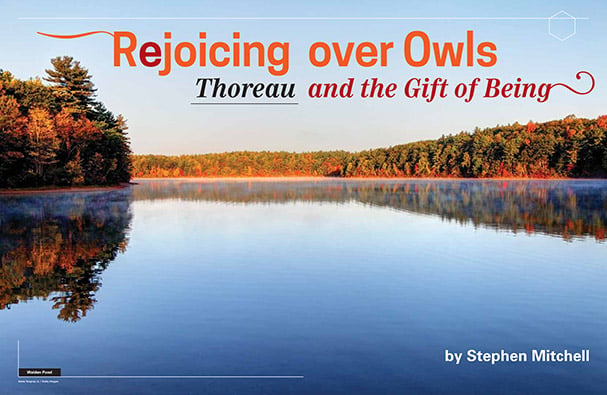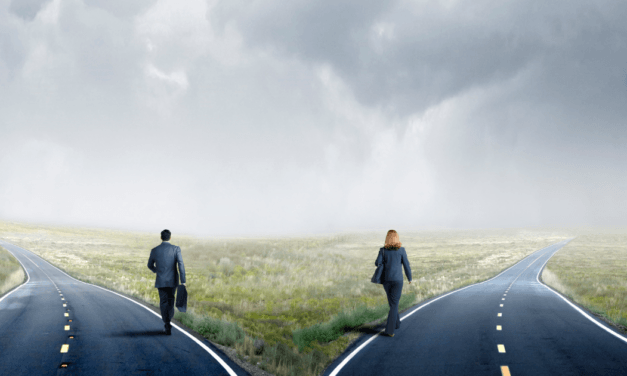This article first appeared in the CHRISTIAN RESEARCH JOURNAL, volume 39, number 05 (2016). The full text of this article in PDF format can be obtained by clicking here. For further information or to subscribe to the CHRISTIAN RESEARCH JOURNAL go to: http://www.equip.org/christian-research-journal/
To those who believe contemporary Western culture tends to languish in the trivial, Henry David Thoreau offers a welcome challenge by inviting us to “consider the way in which we spend our lives.”1 At Walden Pond, he spent two years rigorously considering his own life so as to discover what is essential to the life of a human being. “I went to the woods,” he writes, “because I wished to live deliberately, to front only the essential facts of life, and see if I could not learn what it had to teach, and not, when I came to die, discover that I had not lived.”2 Thus, while practicing minimalism, Thoreau developed a vision of life that rejoices in nature’s fruitful abundance. He “wanted to live deep and suck out all the marrow of life, to live so sturdily and Spartan-like as to put to rout all that was not life.”3 As a celebrant of creation, Thoreau is important for the joyful seriousness with which he receives the gift of being, even though his confidence in individual human beings and his suspicion of human civilizations are simultaneously too strong.
Thoreau is a strong advocate of individual freedom. In Civil Disobedience, he declares, “I heartily accept the motto,—‘That government is best which governs least’.…Carried out, it finally amounts to this, which I also believe,—‘That government is best which governs not at all.’”4 Because, however, he understands that one’s cultural milieu shapes one’s choices, he does not, despite the apparent anarchy of these lines, accept that whatever one chooses is, by virtue of being chosen, good. As Ruth Lane notes, “Thoreau [is] sharply aware of the disciplines exerted by anonymous social forces,” disciplines that often affect and direct human choices.5 If humans wish to resist these disciplines, he insists, they must discover the internal law to which their lives are meant to conform. Reflecting on the comte de Mirabeau, a French statesman who practiced robbery so as to understand how much courage was necessary to resist the society, Thoreau remarks, “It is not for a man to put himself in such an attitude to society, but to maintain himself in whatever attitude he find himself through obedience to the laws of his being”6 (emphasis added). The man who obeys the law of his being—a law that Thoreau considers as given with human existence and discoverable by self-examination—follows neither the whims of appetite nor the whims of government. Instead, he puts himself in harmony with “an instinct toward a higher, or as it is named, a spiritual life,” a life that requires self-discipline rather than social discipline.7
INTERNALISM
To achieve this harmony, a person must seek self-knowledge in solitude. As Thoreau observes, “In proportion as our inward life fails, we go more constantly and desperately to the post office [or to Twitter]. You may depend upon it, that the poor fellow who walks away with the greatest number of letters…has not heard from himself this long while.”8 For Thoreau, he who does not hear his inner voice cannot know the law of his own being. Consequently, he will be dominated by his society. So dominated, he will make choices that circumscribe his humanity, preventing the full development of his spiritual life.
T. S. Eliot, however, contends that Romantics such as Thoreau place too much confidence in this internal law: “The inner voice, in fact, sounds remarkably like…‘doing as one likes.’…[one listens] to the inner voice, which breathes the eternal message of vanity, fear, and lust.”9 Absent objective moral or ontological criteria, whatever one reports as one’s internal law must, ultimately, be accepted by others, self-reports being the only access one human being has to the internal states of another. Thus, however much Thoreau believes that his own inner law is consistent with universal morality, he teaches an internalism that shades easily into relativism.
ATTUNING TO THE PATTERN OF NATURE
Despite this vulnerable ethical vision, Thoreau portrays the world as an ontologically good place where humans can dwell contentedly, even joyfully, given the right attunement of their faculties. In “Huckleberries,” he observes, “The fields and hills are a table constantly spread.…They seem offered to us not so much for food, as for sociality, inviting us to picnic with Nature. We pluck and eat in remembrance of her. It is a sort of sacrament—a communion—the not forbidden fruits, which no serpent tempts us to eat”10 (emphasis in original). Humans, however, do not often enjoy this fruit, because they cannot accept the abundance of nature as given. Instead, civilization trains them to seek power and security through ownership, fostering fake and artificial appetites rather than teaching them to see and accept the riches that nature provides. As theologian William Cavanaugh has argued, “Consumer culture is one of the most powerful systems of formation in the contemporary world.…it trains us to see the world in certain ways.”11 The contrast, for Thoreau, is stark: “Society is always diseased, and the best is most so. There is no scent in it so wholesome as that of pines, nor any fragrance so penetrating and restorative as the life-everlasting in high pastures.”12
This tension between wilderness and civilization (or city) takes its strength from the conviction that concentrations of human beings concentrate human evil. Although probably accurate, this view is incomplete; for concentrations of human beings will concentrate all sorts of human qualities, good and evil. Thoreau overlooks the possibilities for good, claiming instead that “men are degraded when considered as the members of a political organization.”13 For him, nature is the more reliable place of purity. The woods are “temples not made with hands,” temples that offer spiritual communion, provided one enters with a heart not wholly corrupted by society.14 Thus Thoreau sees evil less as endemic to the human person than as the result of human civilization. His answer to human folly is a return to nature as the standard for human life. “The doctrines of despair, or spiritual or political tyranny or servitude, were never taught by such as shared the serenity of nature.…Nature has taken more care than the fondest parent for the education and refinement of her children.”15 According to Thoreau, humans attuned to the patterns of nature will discover both precedent and example for how to live a morally upright human life. “When I walk in the woods,” he reports, “I am reminded that a wise purveyor has been there before me.”16 Nature, then, offers wisdom as antidote for civilized foolishness, cleansing humans from society’s moral toxins. “For at the same time that we exclude mankind from gathering berries in our field,” insists Thoreau, “we exclude them from gathering health and happiness and inspiration, and a hundred other far finer and nobler fruits than berries.”17
SOURCES OF PURIFICATION
In the Christian tradition, however, the wilderness does not reliably purify. To the contrary, it may be a place of steep temptation. It was in the wilderness, after all, that Jesus faced Satan, and the poet John Milton paints the wilderness as a place of assault: wild, aggressive, and tempestuous. In his vision (see Paradise Regained), the placidity that reigns in the heart of Jesus is that which He brings with Him.18 In other words, the internal condition of Jesus’ heart assures His peace, not the scenery. With such a necessary condition of inward purity, Thoreau would be sympathetic. “Love,“ he observes, echoing Milton, “can make a paradise within which will dispense with a paradise without.”19 Nevertheless, between Thoreau and the Christian tradition, there remains an important difference. The Christian tradition teaches that the human fall wrought a universal moral corruption from which only Christ can purify. For Thoreau, however, purification is cyclical: one leaves society and goes into the woods where one is purified from civilization’s toxins. The more time one spends in the woods, the more one is purified to receive the gifts of nature. By contrast, time spent in a town or city dulls one’s receptivity to nature. Thus Thoreau develops a view of human beings in which the inner condition of the human subject determines his or her experience of the outer world, while the outer world determines the inner condition. “Only that day dawns to which we are awake,” Thoreau insists.20 The root of the trouble, though, is, for him, not the corrupted soul but the corrupted milieu. Of his own experience, he writes, “I am alarmed when it happens that I have walked a mile into the woods bodily, without getting there in spirit. In my afternoon walk, I would fain forget all my morning occupations and my obligations to society. But it sometimes happens that I cannot easily shake off the village.”21
The City of Man and the City of God
Because society (the village) pollutes the soul, a person who lives close to nature has a better chance of avoiding such pollution. By contrast, a person whose appetites are formed in the city hardly will find himself walking amidst abundance while in the woods.
He cannot recognize the gift. He cannot recognize the gift because civilizations tend to promote fortress thinking, an attitude linked in the Jewish- Christian tradition with Cain, the first murderer. According to Jacques Ellul, Cain, the first in Scripture to build a city, did so to protect himself from retribution for the murder of Abel or from similar assaults. “Cain is completely dissatisfied with the security granted to him by God, and so he searches out his own security.…from the world, hostile since Abel’s murder.”22 Therefore, concludes Ellul, “the city is the direct consequence of Cain’s murderous act and of his refusal to accept God’s protection.”23
In building his city, Cain is responding to human existence as transformed by human violence.24 Cities are, therefore, troubled institutions in the Jewish-Christian tradition, troubled but not the origin of trouble. Consequently, the Christian tradition offers hope for cities. In the Old Testament, God chooses Jerusalem, a human city, to be His own particular city, one whose failures point us to the New Jerusalem described in Revelation.25 Augustine argues in City of God that, fundamentally, there are two cities—one of man and one of God; and Ellul argues further that the City of Man is slated, as part of redemption, to be transformed into the City of God.26 Thus Christians have strong warrant not to abandon the cities, not to see in them the locus of human evil, and not to see in nature the perfect antidote to human folly.
Yet we also have strong warrant to see—as Thoreau does—deep wisdom in nature and to find in its provisions deep satisfaction. “The heavens,” hymns the Psalmist, “declare the glory of God/and the sky above proclaims his handiwork.”27 To Thoreau who exclaims, “I rejoice that there are owls,” we ought reply, “I rejoice with you!”28
Thoreau never professed Christian faith, perhaps because he thought Christianity too polluted by materialism, perhaps because he could not or did not want to believe that humans are so radically fallen as this faith teaches. Yet he remains compelling for his conviction that he obeys a moral law that is superior to human law or social convention, a conviction that (so long as it holds) prevents society from becoming absolute even as it prevents the individual from making a law of his own whims.29 Possessed of deep gratitude for the created world, he has much to teach us about how to receive the gift of being unencumbered by fears that lead to greed, violence, and injustice. He invites us instead to live deliberately, our souls attuned to nature’s wisdom, rejoicing with him for the gift of owls.
Stephen Mitchell lives near Charlotte, North Carolina. He is a PhD student in humanities.
NOTES
- Henry David Thoreau, “Life Without Principle,” Walden and Other Writings, ed. Joseph Wood Krutch (Toronto and New York: Bantam Books, 1982), 355.
- Henry David Thoreau, Walden (Boston: Beacon Press, n.d.), 85.
- Ibid.
- Thoreau, “Civil Disobedience” in Walden and Other Writings, 85.
- Ruth Lane, “‘Aloof’ from the State: Thoreau on Self-Government,” The Review of Politics 67, 2 (Spring, 2005): 291.
- Walden, 302.
- Ibid., 197.
- Thoreau, “Life Without Principle,” 366.
- T. S. Eliot, “The Function of Criticism,” Selected Essays: New Edition (New York: Harcourt, Brace and Company, 1950), 16.
- Henry David Thoreau, “Huckleberries,” Henry David Thoreau: Collected Essays and Poems (N.p.: The Library of America, 2001), 489.
- William T. Cavanaugh, Being Consumed: Economics and Christian Desire (Grand Rapids: William B. Eerdmans, 2008), 47.
- Thoreau, “Natural History of Massachusetts,” Collected Essays and Poems, 22.
- Ibid., 21.
- “Huckleberries,” 496.
- “Natural History,” 22.
- Ibid., 36.
- “Huckleberries,” 494.
- John Milton, Paradise Regained, Samson Agonistes, and the Complete Shorter Poems (New York: Modern Library, 2007), 310–11.
- Henry David Thoreau, “Paradise (To Be) Regained,” Henry David Thoreau: Collected Essays and Poems, 137.
- Walden, 312.
- Henry David Thoreau, Walking (New York: Penguin Books, n.d.), 8.
- Jacques Ellul, The Meaning of the City, trans. Dennis Pardee (Eugene, OR: Wipf and Stock, 1970), 4–5.
- Ibid., 5.
- Ibid., 10.
- See 1 Kings 11: 36 and Rev. 21.
- Ibid., 170.
- Psalm 19:1, ESV. Cf. Job 28:20–28 and Prov. 3:19–20.
- Walden, 118.
- Civil Disobedience, 97.









